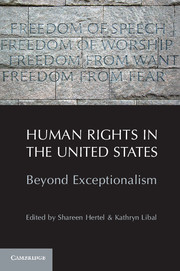Book contents
- Frontmatter
- Contents
- Contributors
- Acknowledgments
- Foreword: Are Americans Human? Reflections on the Future of Progressive Politics in the United States
- 1 Paradoxes and Possibilities: Domestic Human Rights Policy in Context
- SECTION I STRUCTURING DEBATES, INSTITUTIONALIZING RIGHTS
- 2 The Yellow Sweatshirt: Human Dignity and Economic Human Rights in Advanced Industrial Democracies
- 3 The U.S. Welfare State: A Battleground for Human Rights
- 4 Drawing Lines in the Sand: Building Economic and Social Rights Norms in the United States
- 5 State and Local Commissions as Sites for Domestic Human Rights Implementation
- SECTION II CHALLENGING PUBLIC/PRIVATE DIVIDES
- SECTION III FROM THE MARGINS TO THE CENTER: MAKING HARMS VISIBLE THROUGH HUMAN RIGHTS FRAMING
- APPENDIX 1 Universal Declaration of Human Rights
- APPENDIX 2 International Covenant on Economic, Social and Cultural Rights
- APPENDIX 3 International Covenant on Civil and Political Rights
- Index
- References
3 - The U.S. Welfare State: A Battleground for Human Rights
Published online by Cambridge University Press: 05 June 2012
- Frontmatter
- Contents
- Contributors
- Acknowledgments
- Foreword: Are Americans Human? Reflections on the Future of Progressive Politics in the United States
- 1 Paradoxes and Possibilities: Domestic Human Rights Policy in Context
- SECTION I STRUCTURING DEBATES, INSTITUTIONALIZING RIGHTS
- 2 The Yellow Sweatshirt: Human Dignity and Economic Human Rights in Advanced Industrial Democracies
- 3 The U.S. Welfare State: A Battleground for Human Rights
- 4 Drawing Lines in the Sand: Building Economic and Social Rights Norms in the United States
- 5 State and Local Commissions as Sites for Domestic Human Rights Implementation
- SECTION II CHALLENGING PUBLIC/PRIVATE DIVIDES
- SECTION III FROM THE MARGINS TO THE CENTER: MAKING HARMS VISIBLE THROUGH HUMAN RIGHTS FRAMING
- APPENDIX 1 Universal Declaration of Human Rights
- APPENDIX 2 International Covenant on Economic, Social and Cultural Rights
- APPENDIX 3 International Covenant on Civil and Political Rights
- Index
- References
Summary
The fulfillment of human rights is the bedrock of social justice. The 1948 Universal Declaration of Human Rights sparked an ongoing debate over the obligation of governments to ensure the welfare of individuals by protecting their social and economic as well as civil and political rights. Although political rights won early support, the achievement of social and economic rights has lagged. Many in the United States regard the fulfillment of social and economic rights (i.e., the right to work, health, income, housing, education, and employment) as conflicting with the workings of the market economy. Others think of social and economic rights as an impossible dream. Yet since the 1930s, if not before, the nation's top leaders have persistently promoted a human rights agenda, including social and economic rights. Despite such support in high places, the historical struggle to recognize the rights documented in this chapter was shaped by those who put profits before people and/or compromised with racism.
THE ORIGINS OF THE WELFARE STATE: AN ARENA OF STRUGGLE FOR HUMAN RIGHTS
The early struggle for human rights arose during the first major economic crisis of the twentieth century. The total collapse of the economy in 1929 signaled that the laissez-faire relationship between the market and the state could no longer assure profitable economic growth or social stability. Elites blamed their economic woes on the failure of the market and for the first time called on the federal government for help.
- Type
- Chapter
- Information
- Human Rights in the United StatesBeyond Exceptionalism, pp. 46 - 67Publisher: Cambridge University PressPrint publication year: 2011
References
- 7
- Cited by



